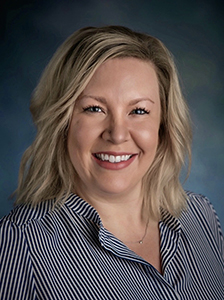Georgia UCEDD Research Effects of COVID-19 on Adults with IDD & DSPs
September 8, 2020

|
ATLANTA, GA - Since the emergence of the novel Coronavirus (COVID-19) last year, and its subsequent spread into a pandemic, we have seen a number of communities step up to face this unique challenge. Many doctors, scientists, community leaders, and politicians are using their strengths to combat this disease. Researchers too, are facing a new struggle to address what happens during and after COVID-19 affects the daily lives of millions of people.
Erin Vinoski Thomas, PhD, is a Research Assistant Professor at the Center for Leadership in Disability (CLD) at Georgia State University. She and her team are exploring the effects of the COVID-19 pandemic on quality of life among adults with intellectual and developmental disabilities (IDD) and direct support professionals (DSPs). They aim to evaluate changes in four domains in quality of life among both people with IDD and their DSPs resulting from the COVID-19 pandemic, and to understand how people with IDD and their DSPs experience the pandemic and seek support from each other and other resources to maximize and preserve their quality of life during this time.
A total of 137 (61 adults with IDD and 76 DSPs) responded to an initial survey in May. The research team has since conducted 18 interviews with a purposively selected sample of the survey respondents, and will follow up with second interviews of those same respondents in the fall. Dr. Vinoski Thomas hopes the findings from this research will allow the team to educate policymakers about changes that can be made to ensure the safety and wellbeing of people with IDD and DSPs in infectious disease emergencies, including policies regarding DSP working conditions, pay, and leave, that keep both populations vulnerable.
Given the CLD's focus on addressing the intersections of disability and racial/ethnic health disparities, Dr. Vinoski Thomas thought it "critical to understand how the pandemic has affected people with IDD and DSPs who also represent racial and ethnic minority groups and live in both urban and rural areas". She reports being pleasantly surprised by the willingness of participants to share their experiences with both the COVID-19 pandemic and what some respondents have referred to as a "second pandemic of racial injustice" with the researchers. She reflects that "their interest in the study shows how important it is for us to gather this information and translate it into meaningful change."
Dr. Vinoski Thomas would like to acknowledge the organizations funding this research, including the Natural Hazards Center at the University of Colorado at Boulder and the Georgia Council on Developmental Disabilities. She also acknowledges the three graduate students who comprise the rest of the research team: Bridgette Schram, MS, a PhD student in School of Public Health at GSU; Rachel Odunlami, an MPH student in School of Public Health at GSU; and Sombal Bari, an MSW/MPH student at the University of Georgia.







